#Xcode
Text
Property cannot be declared public because State is an internal type
yes, comrade Xcode, our work is not done
38 notes
·
View notes
Text
i hate xcode so so so much its so finnicky and annoying ughhh fuck apple
9 notes
·
View notes
Text
Updating the Git user in current machine
When we are doing projects we might need to switch between users like our friend might use our machine and wanted to push their code to their project.
Even at the initial setup of the git project we need to provide our user credentials.
So, as we already know Git always have a easy solution
Open Terminal --> Goto the path of specific project --> type git
If git is already there then we will get git help documentation . If not,
git init ---> git config --global user.email "[email protected]" --> git config --global user.name "keerthidevipriya"
Those are my details. Please replace them with yours dear
14 notes
·
View notes
Text
2022 game list
2022. Truly, the year of uhh. I'm glad that not only can I write this post in the first place, but I have at least a few banger games to report on as well.
Thank Aidios, the list is much shorter than the '21 one. And due to this short length, it's going to be in order, just like my first list!
Shoutout to the three games I decided to cut (Head AS Code\Birth ME Code and Atelier Ryza) - they basically ensured that this year would have been off to a rough start. The former two are a pale imitation of the thrill of Zero Escape that I sought to replicate (complete with an unhealthy amount of innuendos) and the latter... turned out to just not be my kind of game, like, at all. I stared Ryza in the face and thought 'oh god, is this what is considered a fun protagonist these days??'
I was, in fact, impressed, that these games were logged this year and not an eternity ago... 2022 has been kinda rough :(
I'm still looking forward to the third ABiMe game, if only to laugh at it hysterically. I love how much the first two games upset me.
Honorable (maybe) mentions: CrossCode (PC, 2018) [♪ Battle 2]
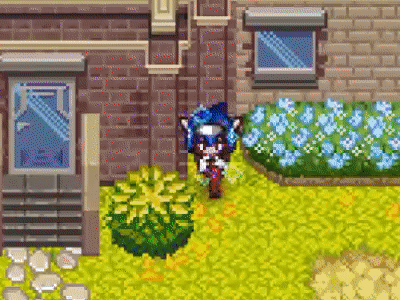
On the surface, this is a game made for me. Incredible pixel art (even down to the squeaky clean UI), witty writing, a charming silent protagonist, a creative plot hook (I mean, have you seen an RPG try its best and mostly succeed at replicating an MMO game?)… but there is one problem.
It's also a platformer. That's all I need to say.
Ironically, this wouldn't be a problem if I didn't like the rest of the game so much - one of the things CrossCode does best is the distinction between the optional and the required. I didn't have to spend hours trying to make sense of the maps or execute somewhat brutal (for me, someone who is very much prone to avoiding platformers that require any semblance of skill) platforming challenges, but... I also did.
I know, I know - it's more telling of the problems I personally have when I play games than anything else, but at the same time, the way the game is structured meant that it gradually became more and more overwhelming for me, as most platformers do (see also: Celeste, Cave Story, etc...). So I ended up dropping it!
Which sucks, because, as I mentioned, everything else about CrossCode is super fun! The frantic battle system (that makes me think of early Ys, but on steroids) encourages you to mow enemies in your path down as efficiently as you can with the skills you yourself get to choose, the side quests do just enough to pull you into the world, the mystery of the very nature of our protagonist is mostly intriguing, and the music is everything you could want from a modern game that takes inspiration from the old, if I'm being honest. I find myself thinking about it a lot outside of the game, and while I was playing, it was a treat to look forward to new tracks.
I was totally ready to fall head over heels for this game, and in the end, I didn't even get to see the plot twist that every review seems to be so upset about! It's a tragedy, really.
Live A Live (Switch, 2022)

You might think I’m refusing to include the usual OST highlight because I personally didn’t think much of the soundtrack (and a lot of the tracks I did like ended up kinda overplayed), but no, I’m doing it because a) the remade OST is consistently taken down everywhere (thanks Square) and b) the remake doesn’t have an option to switch between SNES music and arrangements of it. If I had to put something in its place, it would easily be Select-A-Live, though. Simple, elegant, encompassing of the game’s main draw.
Anyway! Have you ever seen a game that prides itself on being as creative as it is compact (that has been remade maybe just a bit too faithfully)... and then throws all of its pride away in the final act? Cause honestly, this is as succinct of a description for Live A Live as I can muster.
What makes this game unique and seemingly ever enduring in the hearts of fans is how it wasn’t afraid to toy with what RPGs of the distant year of 1994 seemed to represent while also being a sort of love letter and time capsule to stories, tropes and themes of wildly varying sorts. The diversity here - from a wordless story of a caveman learning the joys of love to a straight up Street Fighter-turned-RPG boss rush to a futuristic narrative about duty and humanism and how these two things can clash with one another to... well, you get the point - is genuinely impressive, and with it, it’s easy to see how and why this game, even while being painfully niche, paved way to quite a few modern darlings of the genre.
The intrigue and joy born of brevity makes the subsequent twist even more impressive... in how far removed it feels from the rest of the game. The different paths converging, being forced to fight boundless hatred across time and space... borne of what could be described as either a tragedy worth mourning or a narrative so pathetic it makes everything the game spent the past 20 hours setting up feel insignificant in retrospect, no matter how tightly and lovingly executed it actually was, both in terms of gameplay and narrative.
At first I couldn’t believe the game dared return to the very early makings of the genre it so lovingly subverted. Then I was delightfully surprised - for the last time, as layers of subversion doubled in on themselves. The hero never saved the princess. The world collapses around him as he gets set up by his close friend (who was also, to make matters worse and\or more contrived, cheating on him... with the princess) and exiled from the world he knew, and as the Shakespearean antics of this chapter get cranked up to eleven, everyone the hero has known ends up dead for one tragic reason or another, which makes him do such a sharp 180 on the path of good that... he resolves to spread hate. Across time and space. Yup, the cause of literally everything you had to resolve up until now was a guy with no coping mechanisms who shouldn’t even be aware of half the places his incarnations end up in. It’s... a bit ridiculous.
And, in terms of gameplay, his chapter is aggressively old-school, with its ‘unique’ gimmick literally being random encounters, the exclusion of which I had been ready to praise the game for before this point. If Live A Live wanted me to appreciate what good it had earlier, it succeeded in the worst way possible.
Even starting the final stretch of the game feels strange - unless you choose the ~evil~ path, which, admittedly, is a genuinely wonderful spin on things I wish other games would recreate. Where else do you get to be the big final boss, beautiful sprites and everything, seven times in a row, with your goal being to ruin the lives you fought so hard to preserve just a few hours earlier? Maybe it’s just me, but there’s something weirdly enjoyable about getting to actually exploit movesets that the AI would use against you with a deliberate weakness.
Otherwise, you pick up right where the hopeful ending you painstakingly earned left off, and watch your character of choice whisked away into the world of previously mentioned tragic villain with no rhyme or reason.
From there, you must grapple with random encounters (made awkward with each of the previous characters’ movesets being carefully tailored for their own chapters, but not the semi-random pool of enemies present in this final section) and level design you’ve seen in many other games, while putting together a party comprised of characters who have no reason to know one another, whose sweet little arc ended hours ago. All to Defeat The Big Bad For Real This Time, I Promise?
I suppose that’s not how it actually ends, given the game’s previous well-constructed messages about love and community and righteous anger and all. But holy shit, the drop of quality I got to witness over the climax of the game, no matter how purposeful or cheeky, makes me want to do anything but find that out. I’m fine with how self-contained the initial stories were, and I don’t think this game needed a tacked-on ‘thread it together‘ ending.
There must be something wrong with your game if the most memorable thing its final stretch has to offer is... how gorgeous it looks. Especially since the rest of the game is not really a slouch in that department either - the ‘HD-2D‘ style ends up being the perfect happy medium between being faithful to the original and breathing life into it. Too bad it’s genuinely the only consistently good aspect of this game.
10. Grimm’s Hollow (PC, 2019) [♪ First Reaping]
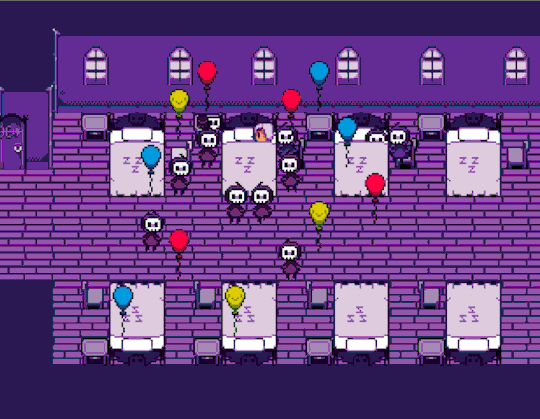
This one was sitting in my backlog for a year and a half, and I honestly have no idea why - I barely even remember how I came across this gem, which is weird. I mean, it’s free on Steam (which is surprising to me considering the quality), cute, has multiple endings, talks about death and grief in that bittersweet way that never fails to restore my faith in humanity...
And best of all, it’s purple. >:) Well, not all of it, but like 80% of this game’s aesthetic is based on my favorite color, which was probably why I got interested in the first place. I wasn’t expecting to see a solid, if a little condensed, storyline about coping with loss and change and learning to make new connections in life and afterlife behind such a simple front, coupled with a neat battle system (and a couple bangers to accompany those battles!) that combines ATB and simple QTEs together in that solid way that vividly reminded me of playing Mario RPG in the kitchen, somehow. It’s sooo nice, at least for the short amount of time the game asks of you! Plus, there’s a decent amount of exploration, no random encounters, and you can just feel the amount of care put into everything. It’s a great way to spend an evening or two, honestly.
The endings you can get range from sweetness of closure to either the protagonist and\or deuteragonist to simple screens that could have passed for game over screens, but it’s fine. Literally the only noticeable flaw this little game has is how it refuses to make clear that you lock yourself out of half the endings by maxing your skill tree! I would have had no idea had I not randomly seen it online.
9. Unreal Life (PC, 2020) [♪ Dance Hall Crisis]
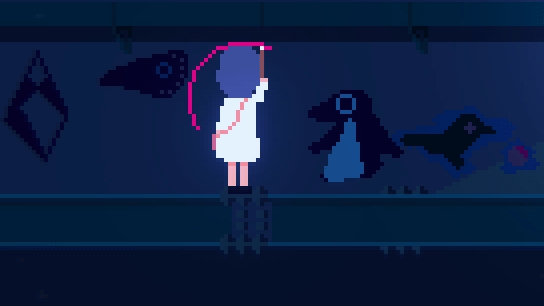
*this game is niche enough that the OST is not on YouTube, I'm linking directly to an mp3 instead. And no, the rest of the soundtrack is not remotely like this track, but who cares? It's my favorite, and I love how the very nature of this piece - being somewhat laid-back out-of-context, but standing out as a faster-paced backdrop for some of the more relatively intense scenes when seen in the game's entirety - says more about the nature of the whole experience than one might expect.
Unreal Life is so true to its name that it comes elegantly close to betraying the core of its story and setup with a mere glimpse at its title... but it manages to make its twist layered just well enough to leave the players satisfied and intrigued, not disappointed. The dreamy pixel art (I'm not sure if I would call this the greatest art seen in a game, but it's obvious that the person who made it all is skilled at converting the limitations of the style into genuine beauty), carefully crafted to convey just the right amount of detail in any given object so they come together in memorable set pieces, and the somber, almost nondescript a lot of the time, music, completes the experience that the game has to offer, every element further selling the feeling of uncertainty, loss and struggle beneath the wonderful sights and strange occurrences driving your curiosity.
I haven't mentioned a lot about how the game plays yet, mostly because it almost always felt secondary to experiencing the world. You walk around. You click on things. You talk to things. You get items and use them. It's a point and click, but instead of a mouse, you have Hal. A 'walk and click', if you will. And there's a lot of walking - almost annoyingly so, I would say, but it adds to the mood. It forces you to sit back and take in what the game throws at you.
The one unique thing the game does is the aforementioned memories - you're able to compare the past and present as experienced by inanimate objects in the world, and it is how you find the majority of clues you need. However, even this doesn't require much thought from you - the information you gain is plain to see, and characters comment on it as well.
The two characters right at the forefront are humans - a young girl in a pure white gown named Hal and another woman, miss Sakura, whose disappearance drives Hal forward across the whole story for reasons not even she can ascertain, imbuing the simple plot hook with a mysterious air. We see Hal struggling to piece together her place in a strange, dreamlike world that alternates between being almost conveniently welcoming and full of painful memories bubbling to the surface, but is always pervaded with a feeling of otherness... But the secondary characters that stand out in this game are all strangely unique - if you try to look at what people remembered most about Unreal Life, you'll likely see lots of talk about... a penguin? a dog? a traffic light?.. Yeah, if you ever wanted to have feelings about inanimate objects and talking animals, this game is for you.
For me, Zero was definitely the highlight of the game, for reasons quite simple - I just like casually rude characters that have changes of heart for the better. Especially if they're a piece of AI manifesting themself as an eyeball (insert AI: The Somnium Files-esque AI\eye joke here for me).
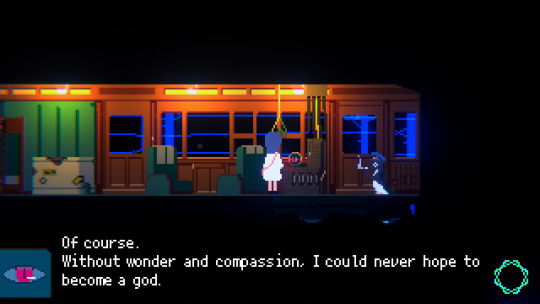
Despite the appeal characters like Zero hold, every piece of this world is, in truth, made in service to the main character - it's Hal's growth you and the other characters observe across the game, it's her thoughts (the ones you can literally access in-game) and memories she magically obtains from objects that move the game forward, and it's her reunion with Miss Sakura that completes it - in ways both expected by that point and surprising at the same time. I liked Hal because the game justifies almost everything about her by the time the end credits roll - you may feel like rolling your eyes at another 'silent, shy, hurt, naive, needs to grow and eventually does' sort of protagonist, but Hal overcomes the challenges set in front of her and within her with a pleasant sort of grace that would, I'd wager, make even the most skeptical players resonate with the image the game paints of her bit by bit.
Through Hal, the game wants to make you think about what you can do, what you want to do. Her struggles, both in the world she's trapped in and the one she came from, are meant to motivate and reassure you - you, too, in time, will know how to accept yourself, to live and contribute to the world. This isn't anything new or fresh by any means, but there's a reason topics like this are so enduring across media. Because there's always someone who needs to hear this in a way that resonates with them personally. And even though I didn't feel that resonance while playing, I appreciated the wonderful execution, even more so when I remembered that this is an indie game at the end of the day. It's kind of a cliche to bring this sorta thing up, I know, but recalling that the wonderful art was done by one person makes my heart swell, okay? You have to respect this game for coming from someone's heart and soul.
...and hey, what other game will give you a jar containing infinite shrimps? That's kinda a dream come true by itself, isn't it?
8. Shantae and the Pirate's Curse (PC, 2014) [♪ Scuttle Town]

Normally this game would get very similar treatment to CrossCode, being a platformer as well (or more accurately, a Metroidvania that takes just enough cues from 2D Zelda, in my opinion), but... I actually had a blast with Pirate's Curse?! Surprising everyone, me most of all. What stars had to align for such a miracle, making me blaze through a kind of game I usually steer clear from (enough that I was hesitant to play it for about a year, despite a hearty recommendation)?
Well... A lot of them, actually. I appreciated the straightforward level\area designs (more so than is probably usual in the genre these days, I feel. My favorite was Propeller Town, because I loved the way the pirate hat\'glider' handled in general) that nonetheless have just enough well-hidden collectibles inside, making repeat trips enjoyable, coupled with the freedom of movement you gain in this game as you progress (with the cannon at the end giving a quadruple jump and being able to dash and glide at the same time... it's so fun to blow through stuff that used to give you trouble with all those tools working together!).
I adored the mixture of pixel sprites (which are animated in such a lively way that it can be legitimately hard to stop staring at how everything moves) and proper character art, even if it took a bit of getting used to. And for the most part, I enjoyed the characters themselves, which do just enough for the game to give you an excuse to saunter around the world, while giving you the feeling of this adventure being a piece of something with a history (i.e. Squid Baron being self-aware and everything Shantae and Risky have going on - it doesn't have to be complicated to be fun).
But of course, the jewel on top for me personally has to be the soundtrack. There's the aforementioned Scuttle Town, which has managed to conquer my brain in ways few VGM pieces do, but also plenty more to enjoy besides that. The peppy and catchy music works in tandem with the cute visuals to ensure the player enjoys themself and remembers the experience fondly - and it really pays off!
Now, it's not like the game was without flaw - there's barely anything that qualifies as fast travel (aside from the usual 'warp back to town' item that doesn't work when you would need it most), which leads to some excess backtracking being involved; and the writing is nothing to write home about, aside from the aforementioned sense of continuity and some funky fourth wall breaks here and there. But in my heart, both of these can be excused - Curse is very much trying to carry that old-school game spirit within itself, and I didn't exactly play it to be wowed by a grand story. For the most part, the game achieved what it had set out to do, and impressed me enough to consider playing at least one more Shantae in the future, so it's hard for me to call it anything but a success!
7. 13 Sentinels: Aegis Rim (Switch port, 2019-2022) [♪ Brat Overflow]
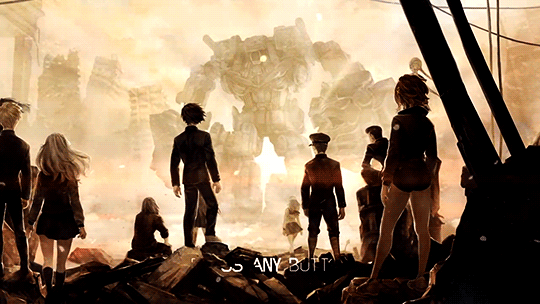
This is one of my favorite video game title screens, if we’re being honest. Everything about it just works - seeing the protagonists stand together against the literally looming threat, with what turns out to be their true hope right in front of them, with muffled sounds of siren-like voices and machinery as an accompaniment.
And then, a mysterious blue light flashes by, and our protagonist - well, one of them, turns to face the camera with an almost inviting expression on his face, as the song fully fades in together with the game’s logo. Yes, this is what 13 Sentinels is about - just another game about teens and young adults saving their doomed world from an inhuman threat. Somehow.
Or so it would seem, because a core part of this experience is watching the layers and layers of fuckery unveil themselves. ‘Oh, okay, so this is a time travel story!‘ Nope... I mean, kinda... ‘Oh, I get it, they’re teleporting!‘ Nope. ‘Oh, so the protagonists are all aliens, huh?‘ NOPE, it was a post-apocalyptic story all along!
‘Hm, I guess it really is just about beating the monstrosities, huh?‘ Not even that, that was just a side effect of lazy coding in the simulation that fifteen researchers forced their infinite clones into so they could survive on their way to infinite inhabitable planets. Which means that in the process of saving themselves, humans committed a very, well, human error that caused more problems than it solved, but in the end, reached their goal. This is how the game manages to both ask the fundamental question of ‘why bother with anything‘ and answer it in a defiantly hopeful fashion in one fell swoop.
So basically, the moral of this game is both ‘check your code before you commit‘ and ‘humans will stand proud in a vicious cycle of death and rebirth to protect the world and people they love‘. That’s both nifty and fucking nuts.
Of course, this is a small, surface level observation, and it doesn’t begin to cover everything that’s going on here. There’s cloning, a talking cat, androids, high school shenanigans, nanomachines, a gay awakening or two, a fucking shitload of artificial intelligence, identity crises of multiple kinds, and far more cheesy romance than was probably necessary (I guess 60% of this is set in a Japanese high school, but still... everything was dreadfully predictable lol)... There’s so much going on that, apparently, even the writer himself talked about struggling to keep the mysteries together in his head!! And a huge chunk of the story didn’t make it in because of time and budget constraints, with some of it only being explained in the game’s own information analysis section! (It honestly really shows, especially when you see the ending being set in the simulation and not the real world.) Like, let me tell you, when it comes to being convoluted, 13 Sentinels can give basically any game a run for its money!!!
So, then, why did I, someone who hates having convoluted jargon shoved down her throat, stick with it? Simple: I was lured in. Playing the story sections of this game is like watching a painting come to life, for many reasons. The gorgeous set pieces provided (with INCREDIBLE lighting. Screenshots don’t even do justice to how stunning this game is, because the lighting in these sections consistently blows your mind.), top-notch voice acting (made even more impressive by the fact that it was recorded outside of any studio, honestly) and the titular 13 protagonists’ growth arcs (turns out, they grew both as people and in the literal sense, ha)... It all makes for a very immersive experience - before you know it, you’re shouting at the screen as you get hammered by the numerous reveals this plot has in store for you... or watch Hijiyama lose his ability to think about anything but yakisoba pan.
Sure, the protagonists are often playing by the tropes, and, as mentioned earlier, the relationships between them are a mixed bag, but out of such a huge selection and\or mess of a story, everyone’s bound to find some part they enjoy. Personally, I’d say Ei’s story about finding one’s identity anew (immediately after committing murder) while falling in love with a schoolgirl next door (who definitely didn’t want to be involved in anything resembling a crime, especially one concerning her alternate self, but oh, she’ll do anything for his man, including becoming a schoolgirl with a giant robot.) was my favorite - again, just the right tropes and mood for me! >:) And in general, there are countless little details that show how much care intended to go into this game, making sure every protagonist’s story lines up or simply making it all more believable, ironically enough. In an alternate world where the developers had more time and resources... this whole cast might have been one of the greatest in video games (there was lots of build-up material planned and cut), but as is, they’re just good.
The last part that pieces 13 Sentinels together is its battle mode, where you actually get to control the ✨giant robots✨ directly and save the world. It’s a simple mix of real-time combat and tower defense, with little nuggets of quality character banter and lore files being your real reward for engaging with it. I mean, if you like this sort of thing, you won’t be feeling robbed or anything - each character has unique skills, and the game encourages you to experiment with your loadout... there’s even multiple difficulty levels and an ‘endless’ mode you unlock after the main story! But to me, the core appeal was in how mindless most of it was - number go big, kaiju explode, yippee... And then the final two stages turned my simple strategies on their head and sucked the fun out of the whole experience at the crucial moment when the story, for the most part, pieced itself together and I was feeling pumped! Oh well, ultimately, before I hit the roadblock, I was having fun putting on a show for Yuki-chan. :p
The soundtrack of this game is something I really appreciate, as well. Well, not all of it - the story section’s music didn’t leave much of an impression on me, but the battle music... Why, yes, I love bashing manufactured robots’ heads in while dynamic electronic music with juicy bass blares in my speakers!!! In fact, hearing LYSINE randomly in a Youtube video was enough to spark my interest in this game in the first place. It’s absolutely one of the greatest highlights of my personal experience.
Ultimately, this is another passion project that came close to biting off more than it could chew, but the effort put in ended up shining through in almost every aspect. This was a strangely unique experience for me, one that made me reevaluate, at least a little bit, what I actually like about games I play. It might not stick with me in ways most other stories do, but I’m thankful to have (almost) completed it anyway!!
6-5. Ace Attorney: Dual Destinies (3DS\Android, 2013)
[♪ Difficult People]
Ace Attorney: Spirit of Justice (Android, 2016)
[♪ Dance of Devotion]
Look, I made the fifth and sixth mainline entries take fifth and sixth place, I'm a genius. (not really) Prepare for a somewhat nonsensical ramble as I try to piece together my far too numerous thoughts on them!
My favorite thing about these games might be how controversial they became\are in the eyes of the fanbase. If you ask some of the more invested people, they'll spare no quarter in trying to convince you how the change in the writing staff is the greatest blight on Ace Attorney as a whole... and then you play the games, and it goes a little something like this ('I pray for your ass' is 100% accurate, can confirm).
What I'm trying to say is... AA5 and 6 are surprisingly... good? Or, more accurately, not bad? Just different. I can understand how I have an inherently unusual perspective compared to long-time fans just by knowing in advance about the reason these games never quite feel the same as even their direct predecessor (cause, again, a lot of it is due to the original writer being forced to work on spinoffs at that time), but even then, I don't think being unaware would have changed my opinion too much. It's clear Yamazaki and co. had put some thought into these games, and besides that, it's just strange seeing the games bashed because of the new person at the helm, given that he also handled the fan favorite Investigations games (and yeah, I love them too, but I think in the end I appreciate the mainline games more).
Also, story-wise, AA4 was pretty weak; I'm sure things would have been different had it received a proper sequel that it clearly planned to build up to instead of the soft reboot that we ultimately got, but on its own it never stood out to me, probably because I don't seek serious affairs rife with a moody and inconsistent air from this particular series, so I was never upset with having to see those lingering threads go down the drain in the first place. I never really understood the allure behind the characters of Apollo (the most normalest guy in the world) and Trucy (who I think just exists to force a dichotomy between the changes Phoenix went through and his decidedly still soft heart), either, so I didn't really feel like there was anything to massacre in 5/6 (except for Phoenix - he truly had no reason to return to law, ever, and his presence sours both sequels and strips them of potential just about everywhere. The time we had to spend with him could have been used to explore Athena or Apollo's childhoods!!)
A lot of the problems DD and SoJ show - the struggle to have a proper story to tell, the dated humor (that naturally works better in these games, since they're more recent - Retinz's haughty 'I'll do anything for those clicks, baby' attitude in particular is a decent impression of what is just close enough to what would probably be called being an influencer in the modern day), the drawn-out trials such as 5-3 and 6-3 or 6-5... they all existed in some way or another even before Apollo Justice. Of course, that doesn't mean we can absolve the games completely of these flaws, but they shouldn't be unfairly judged, either. It's why I prefer to focus on the things I did enjoy here, even if DD has remarkably few of them.
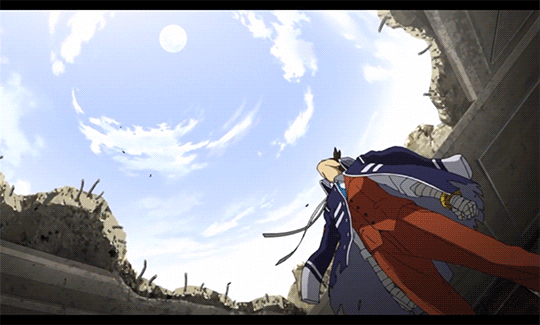
You see, I initially was ready to declare Dual Destinies my new favorite game - Athena's introduction made quite a splash (truly, a multilingual neurodivergent icon the series did not know it needed), the shift in music style was intriguing, and Simon became my most beloved prosecutor in the whole series almost instantly (and for better or worse, he still is.) I also liked the unusual linearity this game has, just because I like things decently straightforward in my games.
As AA5 dragged on, however, the linearity felt more like a flaw than an asset, serving only to make the game feel empty. Other cracks started to show as well - the decision to split screentime between three protagonists harming each of them in turn (even if it was fun seeing how the Space Center linked Apollo and Athena before they even knew each other, it felt forced more than anything due to lack of a setup), the multitude of directions they try to take the game's prosecutor in and inevitably fail to capture the aura this 'archetype' had in previous games, resulting in a character that does barely enough for the story and leaves you eager for more (assuming you don't straight up dismiss him and his edgy attitude), the weakest soundtrack in the series, the unsubtle development of Athena's character (along with similarly blunt theming around 'the dark age of the law' and such, which I can only assume was done in an attempt to make the game easier for newcomers to approach... even though this is the fifth game in a storied and normally interconnected series... huh?)... things like that piled on quickly and soured my impression a hell of a lot. At least I had Simon in all his glory to keep me going - just like someone on Backloggd said, he 'deserved a better debut game than this'.
So in the end Dual Destinies turned out to be a lovable mess, the first half of it testing your patience and the second offering a payoff that's only enjoyable if you are invested in a character that, to many, pales in comparison to the series' past (I loved him, though, so by extension, I can’t help but like his whole game). Ah, and you can spend money to defend an orca, which is more fun to talk about than actually experience. What about Spirit of Justice?
To put it bluntly, it's also a mess, arguably a bigger one. But discussion of this specific entry deserves to have more nuance than this - if Dual Destinies is like having to dig through layers of dirt before chancing upon a solid chunk of gold, Spirit of Justice is like eating a burger that's serviceable, but it has bits of your favorite sauce all over the place, so you can't help but be tempted to finish eating the whole thing, even if it is in actuality mediocre. So let us ask the question once again - what about Spirit of Justice made it ultimately more enjoyable than its predecessor?
The simple answer is that Dual Destinies, being middle-of-the-road in most respects, unintentionally does a great job of lowering your expectations for whatever comes next. Because of this, my opinion on Spirit often changed drastically while I played it - I liked it overall, but I felt like my enjoyment of it went against basic logic. Again, it was like eating your favorite piece of fast food - you know it's not exactly good for you, and you feel baffled about how much joy it brings you, but you can't stop yourself from feeling that joy.
My thought process while playing the majority of Spirit was something like ‘well, this story may be absurd sometimes, and the land of Khura'in, a setting created out of desperation to fix that was not broken before the new writers worked themselves into a strange corner, is just a bit shy of an affront to the audience’s intelligence... it continues to make a mess little by little of both pre-established character arcs and those of newcomers, and this is probably just the surface of a sizable list of reasons this game could be rightfully considered a disappointment by some… but guess what? There’s just enough remnants of squandered potential that, fortunately or not, the game has me hooked’.
That remained the case until the credits rolled and I stared at the phone screen with waves of a strange mixture of regret and satisfaction. To say that this is a weird way to end an entire series is frankly an understatement.

But in general, Spirit tries its hardest to appeal to the player on many fronts at once. The 3D models and animations’ quality has increased noticeably compared to their first attempt with Dual Destinies (and a lot of the witnesses are a joy to interact with as characters, too), the investigation sections, for the most part, are more substantial and thought-out than the previous game (you actually have to think about how to progress sometimes, wow!!), the attempt to have a story with a bigger scale is, if nothing else, something to be admired, and the soundtrack... why, it might be the best in all of Ace Attorney.
Music as a whole here is lots more memorable and moody, with many tracks for events based in Khura'in having a sort of specific somber and mysterious feel to them never seen in the series' past, and pieces that play while court is in session lending trials a resolute and somewhat desperate air (the cross-examination music in particular is my favorite across the whole series.), fitting of the stakes continuing to rise as you make your way through the story.
Yeah, that's right - they actually made another attempt to make an overarching plot work in an Ace Attorney game! And, as mentioned earlier, they tried to expand its scope beyond things we've seen before! Not to mention the countless characters from series' past they could not and would not let go of... and all of these things had to compete for space in a game, that, while being the longest in the franchise by a large margin, is constrained not only by series' tradition, having only five cases to unfold the story in, but also by just how much filler there is.
While Turnabout Storyteller is my favorite case in the series, period (the banter between prosecutors is great, most of the jokes land, and it has a great witness with well-handled DID representation in Uendo), it has little to say about what’s going on in the world at large, and I could talk forever about how flawed the parts of the story that do concern that are (I decided to cut all that inane rambling from this post, jeez).
So, it’s no wonder people have debates on the quality of this game to this day, especially its controversial handling of characters both old and new. Athena having all development of her character reversed, Apollo getting a contradictory backstory to bend the plot to the writers’ needs, and Nahyuta having his character arc compressed so much that his heel turn ends up being nonsensical, among many other things, like how in court, he manages to alternate between clean, sensible logic and running down the defense with raw insults, which continues to go on for three more cases barely unabated... It’s a mess from the word go, but there’s some heart in it, and it tried something new. That’s why it’s a game that I think will haunt me for a long time.
4. Panel de Pon\Tetris Attack (SNES, 1995) [♪ Thiana's Stage]
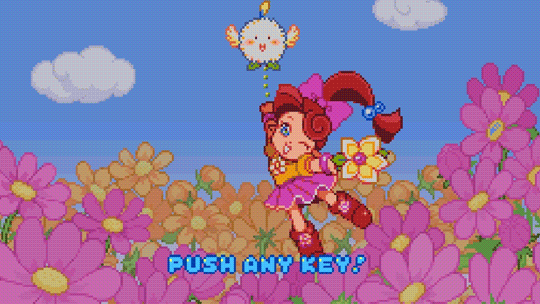
What could give a game that is about nothing but matching blocks by color such a high position? The fact that it has so much more to offer than just blocks. ...and the fact that I like match three games. With a caveat.
Said caveat is that I'm actually not overly familiar with games of that sort - I've barely played Bejeweled or whatever else might come to your mind when you think of the genre. Instead, there is a certain series of games called The Treasures of Montezuma that holds a weirdly special place in my heart.
When I was less than ten years old, I was glued to the PC screen, watching my mom and dad take turns obliterating colorful pieces on the screen to really repetitive music, and now here I am, an actual adult, doing the same thing to relax and pass the time. In fact, I made it a point to go through that series one by one over the course of this year, as a sort of nostalgic boredom killer, watching the games hit their stride and fall from grace after the first three entries (cash grab lol).
The things that made that series different from what I would usually see in the genre (and that ultimately made the whole family love that goddamn series for years) were as follows:
you can move other pieces while the ones you already matched are disappearing;
you're incentivized to plan ahead in one way or another to execute massive combos;
there's a fair number of different modes with the same core mechanics to keep things from getting stale.
Sound familiar? Yup, Pon hits all of these points just as well, with a puzzle mode and a VS mode that is a plain joy to play with someone else and delivers some satisfying challenge if you go through it on your own!
But not only does it play in a completely different way when you get down to it, it also (gasp!) has great, poppy visuals and music that is not repetitive! And it has multiplayer! I was not expecting to love a game that just randomly grabbed my attention with its bright and fuzzy game cover standing out in the list of (pithy) NSO offerings (RIP🥺) as much as I did. But it was too well-made not to!
Another important thing is that Pon is probably a hallmark of 'easy to understand, hard to master'. Sure, matching blocks is, as mentioned, not the hardest thing to comprehend in the world, but the unique thing about Pon is that said blocks come from the bottom, not top. You have almost complete reign over them - you can swap any two blocks that are next to each other horizontally, or make one of them fall down from an empty space.
This allows you to not only match blocks in threes one by one, but, more importantly, to set them up so they fall down and clear themselves in chains as well (or set up columns so that you clear 4 or 5 blocks at once all on your own, instead of praying to RNG to give you such a combination). Learning to set up and execute chains is far and away the most important part of this game, and it's what makes it unique, because, thanks to the aforementioned restrictions, the process is different from both other match-threes and games like Tetris and Puyo Puyo (neither of which I actually really like, so imagine my surprise when Pon consumed my soul for a few months...).
A successful play session of Pon requires many things - the knowledge of how chains are set up and executed, the reflexes to actually follow through on the execution, the ability to adapt to the random wall of blocks thrown at you, the understanding of how garbage blocks work in VS... The things people pull off at competitive level still seem like a fever dream to me, and even though I kind of feel like I got as far as I could in terms of skill, in the grandest scheme of things I'm probably barely above a beginner.
And yet, the game leaves you free to play at any speed you want, with most modes also offering you three difficulty levels - and the lowest settings make blocks crawl slower than a turtle. This kind of accessibility, combined with cute music and actually unreasonably pretty and sweet character art, makes this one of the most welcoming games I've ever seen - and I never have a bad time when I decide to sit down with a music playlist of my choice and just crawl my way up from minimum speed to... the actual maximum (99) on Easy or about halfway there (I maybe only broke 60 once or twice) on Hard.
So, basically, this might be the Chrono Trigger of puzzle games for me. I still think to myself about how badly I want to play it on a proper SNES controller now and then.
PS.

3. Trails of Cold Steel (PC, 2017) [♪ Investigation]
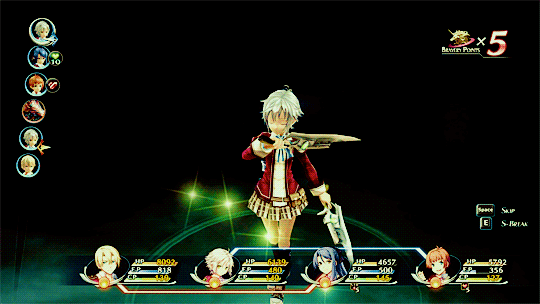
It's funny, I ended up posting about two Trails games at once, and yet, I made it a point for myself to take a long break between the two - an action that is, in general, greatly advisable, since Cold Steel manages to feel familiar and strange at the same time, and playing it without tempering your expectations can lead to ruin. Its high placing among the other games of the year is well-deserved, but compared to the rest of the series, in most areas, it falls short - this is a good RPG, but a barely acceptable Trails game. Not in the least because the protagonist's role can be aptly summed up with this (one of my favorite videos ever, I think.).
There are just enough things about this game that are consistently enjoyable and still feel (mostly) worthy of the high standards set by the series' predecessors that I managed to plow through it beginning-to-end in three and a half weeks, which is definitely comparable with my previous series track record (maybe even surprising myself a little.). The setting's structure takes cues from both Sky (with separate locations that you get to visit and thoroughly explore for a chapter that together make up the whole of a region) and Crossbell (with Trista and Thors Military Academy serving as a hub-like place where you get to observe fellow students' progress throughout the year) for an interesting attempt to shake things up a little and convey the growing sense of scale that surrounds Erebonia as a whole.
The shift to 3D, for the most part, is... inoffensive? There are two specific losses that came about as a result of it that I can't help but mourn (one is expressive character portraits, the other is the disappearance of our good old friend the battle grid, which demolished what little importance the MOV stat had in one fell swoop.), but as a whole, it's a very appropriate change and executed just well enough to not ruin whatever immersion you might have. And that's good enough, since graphics were never the series' biggest draw...
But the soundtracks are definitely one of them. The music in this game is a little hit-or-miss at times, especially compared to a game like Azure (at worst it just does its job, at best it haunts you at night - I guess I'm just being picky because of my experience with Trails ¯\_(ツ)_/¯), but it definitely manages to feel unique compared to previous entries by trying to go in a more 'orchestral' direction. There's a lot to like, even if it doesn't feel like it measures up to the past at times - at least a few battle themes are bangers as usual, and this game probably has the greatest amount of gorgeous and atmospheric field tracks you just can't get enough of. But for every track I genuinely love, there's always one or two, especially when it comes to battle music, that made me think 'okay, this is neat, but it's definitely not the same any more :('. Not to say it's bad, it's just... good at being different, I guess.
The NPCs, especially the ones around Thors (I love Beryl, Mint and Linde) and the ones that end up travelling places alongside you (most notably Annabelle and the classic duo of Ricky and Anton), also manage to bring joy whenever they appear. The more static ones suffer from the same problem they did in Azure - they serve more as set pieces than anything else at times, and they're part of the bigger issue that is this game trying to draw from what is, seemingly, more modern anime tropes. Man, that hurts to type. You could say that that sorta thing plagued the series since forever, but nowhere is it more noticeable than here.
It also, naturally, affects the story and its pacing, as well as the more prominent characters. I used to fear the school setting would ruin what the series has been building up towards, and it sorta did, but the crux of the problem is really the repetitiveness of it all. Start the month, do quests around the academy, explore the schoolhouse (half of which is basically a waste of time), go on a field study the next day, act a mediator to resolve a conflict in your class, watch tensions in the country rise in some way (very slowly), help out to mitigate that, go home, repeat for 70% of the game... eventually it all starts to feel like Groundhog Day or something.
That feeling is not helped by some characters feeling more like gimmicks than people - while I appreciate what the game managed to show about, say, Elliot's family or Gaius' connection to his homeland, at the same time it tries its damnedest to reduce them to 🎶 and 💨 respectively. And then there's Alisa, who manages to have a somewhat impressive arc about gaining independence and starting to find purpose in life (which matches Rean neatly, because half his deal is also searching for it. It's cool.)... but she has literally the worst introduction that feels as if it wants to ruin your impression of her (I've had enough girls falling on top of guys and vice versa for a lifetime, thanks). It's almost impressive how much fluctuation there is in how the members of Class VII are handled, especially when you remember it has someone like Emma whose whole deal is... well, maybe she'll tell us in the next game. They really want you to play the next game.
Even the characters I ended up actually enjoying (Jusis and Fie, mostly) got my attention in a way that feels... surface-level. Sure, this game can give someone a decent arc when it wants to (we love us some found family-lite), but it's not quite enough. Yet another way in which this game leaves you hungry for more.
Speaking of scale, it ends up feeling off on two fronts. One, the game resorts to telling you about it rather than showing it most of the time. Erebonia's capital is supposed to have a population that's two and a half times bigger than Crossbell's, and yet the 'half' of Heimdallr that you get to explore never really measures up to that expectation. It's fun to walk around there in its own right, but the writing surrounding the place creates a strange sense of dissonance... I don't know, I don't like how much that specifically felt like a reach.
Two, this game being concurrent with Zero\Azure is an interesting choice, but at the same time it feels like a taunt. Azure left us on a tense parting note, but instead of getting to explore the resolution of a goddamn occupation, we travel back in time to go to a military school. Yeah, great. It's especially silly hearing some NPCs freak out over the events that led to it all and how it affects them (most of which you are expected to already be familiar enough with), while the main story wants the player and the main characters to cast it all away and enjoy some festival.
I get it, and it's actually quite an appropriate thing to do given their position as literal students, but it's still quite ridiculous, and even the way all the endgame happenings undermine this sense of security you were told to upkeep is too sudden and strange to actually be enjoyable. (not to mention the final final boss that came out of nowhere... *grumble grumble*)
They really want you to play the next game. And the thing is, I will... next year... But only because I'm still waiting for the previous plot thread to resolve itself. And because Trails gameplay is Trails gameplay, no matter how many changes it goes through. (I ended up skimming over this particular matter, but all you really need to know is that the game balance here is particularly skewed, making random encounters feel like mere tissue to tear through and boss fights feel drawn out and easily won.)
2-1. Xenoblade Chronicles 2 (Switch, 2017) [♪ Our Hope]
XBC2: Torna ~ The Golden Country (Switch, 2018) [♪ Battle!!]
Xenoblade Chronicles: Definitive Edition (Switch, 2020)
[♪ Where the Ancestors Sleep]
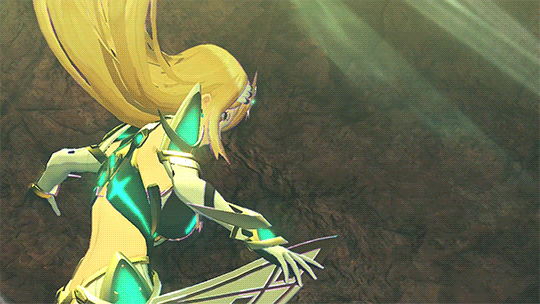
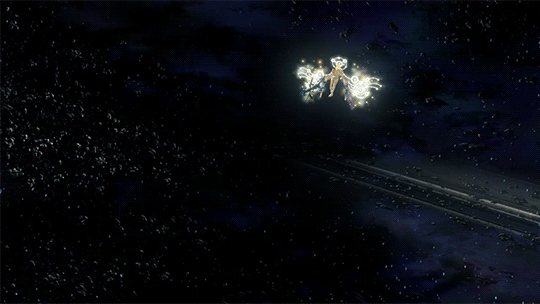
(yesss, I get to use my own gifs!! Consistent tagging sure pays off)
Xenoblade made me realize for the umpteenth time how much I love JRPGs. Xenoblade introduced me to the latest and greatest of characters I just love putting in the mental microwave. Xenoblade helped me meet lots of wonderful people. Xenoblade was there for me when I actually felt like utter shit trying to think about the future.
There is no way anyone should be surprised about this placement. For months, I’ve been struggling to describe just what makes this series so great, because the thing is, it’s just about everything. The games look great and offer you lots of vibrant fantastical vistas to explore, they manage to combine intriguing characters with compelling settings, they have incredibly diverse soundtracks, they break the universe in half in multiple ways before folding it back together and leaving you full of hope. That last thing is why I’m putting them all together here, instead of being needlessly petty and leaving one of them behind - while it’s true I initially found myself preferring 2 to 1 and still think it’s the more... ‘welcoming’ game out of the two, it’s their combined existence that serves to propel them to heights equal to my all-time favorites.
Just like with the other... half a dozen games on this list, I could go on forever about the details I find interesting to think about, or the things that surprised or infuriated me, or just... the battle system of Xenoblade 2 alone...
But the one thing that matters is, I’m glad I gave these games a chance exactly when I did. It was precisely the right moment that made them resonate in that unique way that I think we all seek out in media.
The future
I had this section planned out roughly for '21, so what I'll do this time is mix together the lists for both years. Here's the first year's list, woeful as it is:
Ys IX: Monstrum Nox
Ys vs. Trails in the Sky
Dinosaur - patch still isn't out at the time of writing.
Legend of Heroes II: Dragon Slayer
Tokyo Xanadu - played the first two chapters or so, ended up beating Trails first
Popful Mail
Trails of Cold Steel
AI: Somnium Files
Sakuna: Of Rice and Ruin
WarioWare: Touched
3DS Etrian Odyssey
Atelier series
Now for more relevant predictions, mostly obvious given the current list:
Trails of Cold Steel II
Great Ace Attorney, with the rest of CS being at least after this
Xenoblade Chronicles 3
Dead Cells (I have high hopes for the relatively recent updates)
Final Fantasy VII Remake
#yearly game list#long post#flashing gif#zero.txt#aa#trails#xcode#< i think that was the tag back when i was hopeful about the game#xb#13s#im posting it two weeks early screw it#if you read the tags first be warned i do not do xenoblade justice in this post#trust me i tried and i just couldn't Word#guess i should be happy i didn't have to do the same with ct
7 notes
·
View notes
Text
Oktober 2022
Yak-Shaving für Astronomen
Als Yak-Shaving bezeichnet man iterative Prozesse, bei denen man, um ein Problem zu lösen, immer erst ein anderes Problem vorher lösen muss, das wiederum die Lösung von noch einem anderen Problem erfordert, und so weiter. Mein Ausgangsproblem: Ich habe ein Bild aus einem Teleskop und will einen Katalog der Sterne in diesem Bild machen. Dafür gibt es eine Reihe von vorgefertigten Programmen, ich muss das nicht selbst programmieren. Eines der gebräuchlichsten heißt “SExtractor”, kurz für “Source Extractor”, und, ja, der Scherz war vermutlich mal für drei Minuten lustig, damals, als SExtractor das Licht der Welt erblickte, also circa im Jahr 2000. Ich habe genau dieses Programm schon damals verwendet, es war mit Abstand am einfachsten und schnellsten für diese Aufgabe.
Aber damals hatte ich auch noch einen Linux-Computer, der von einem IT-Experten gewartet wurde. Die Software-Installation beschränkte sich für mich darauf, eine Email an diesen Experten zu schicken. So war es auch 2005, als ich meinen ersten richtigen Job antrat, und auch 2007, beim zweiten: Ich bestellte beim Arbeitgeber einen neuen Rechner, und sagte gleich dazu, welche Software ich benötige, fertig. Diese Zeiten sind vorbei, heute sind wir alle System-Administratoren und Software-Yak-Shaver. Astronomie machen wir auch noch.
Mittlerweile ist SExtractor in der Version 2.19.5, und existiert nur als Quellcode, wie so oft bei Spezialsoftware für Astronomen. Man kann es aber einfach auf jedem Rechner kompilieren, der Linux-kompatibel ist, also theoretisch auch auf Macs, solange alle nötigen Libraries schon da sind. Sind sie natürlich bei mir nicht. Diese “Dependencies”, also Software, die andere Software voraussetzt, die wieder andere Software voraussetzt, die Versoftwarung von Yak-Shaving, sind ein generelles Problem unseres Software-Ökosystems, und jeden Tag huldige ich Programmen, die einfach so laufen. Topcat! DS9! Seid umarmt. Zum Glück gibt es zum Management dieser Dependencies wieder andere Software. Ich erfahre von Macports, das nach der Installation auch beinahe sofort läuft, und Macports weiß schon, wie man SExtractor installiert. Eine Weile geht alles gut.
Dann teilt mir Macports mit, das es noch eine vollständige Installation von XCode benötigt. XCode gibt es beim Apple Store, und es dauert auch nur eine Viertelstunde, bis ich dort Zugriff habe – der Account zeigt auf eine uralte Emailaddresse, und die Sicherheitsfragen sind verwirrend. Mein erster Lehrer? Wer sollte das gewesen sein? Dann finde ich heraus, dass die angebotene Version von XCode nur auf einem Betriebssystem läuft, das ein paar Versionen jünger ist als meines. Jetzt gibt es zwei Möglichkeiten: Entweder das Betriebssystem auf den neuesten Stand bringen, was zur Folge haben wird, das diverse andere Software auch neu installiert werden muss, und eventuell nicht mehr geht. Oder einen Developer-Account kaufen, und damit Zugriff auf alte XCode-Versionen zu haben. Beides rote Linien in meiner Yak-Shaving-Philosophie.
Oder aber das ursprüngliche Problem mit einer ganz anderen Software lösen. Oder es überhaupt nicht lösen, ein viel zu selten benutzter Problembewältigungsansatz.
(Aleks Scholz)
#Aleks Scholz#yak shaving#Astronomie#SExtractor#Linux#Dependencies#Macports#XCode#Sicherheitsfrage#Betriebssystem
5 notes
·
View notes
Text
e452- Before and After
Michael R shares his experience and expectations on Apple's Vision Pro.
Andy Representing at #FOSDEM24
While Andy is at FOSDEM and Michael M. Is traveling for business, Michael R. Goes deep on his experiences with the new Apple Vision Pro. He explains his history with Apple products, and is excited that the VP of Developer Relations at Apple sent him a note as a launch product app.
He begins with a little back ground on his history of using Apple products, from…
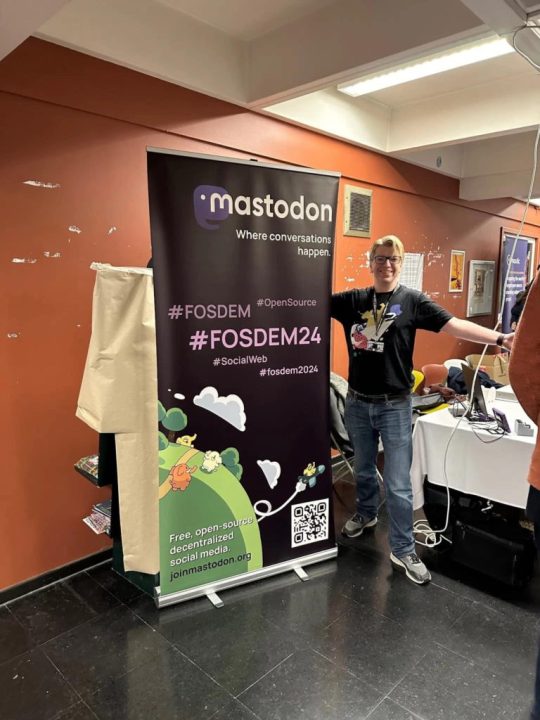
View On WordPress
#Apple Vision Pro#ar#Christian Selig#Demo#Ferrite#FOSDEM#FOSDEM24#googly eye#Juno#Marques Brownlee#Persona#Spacial Computing#twit.tv#Unboxing#visionOS#vr#Wasted Time#Wasted Time Pro#Xcode
0 notes
Text
#AndroidStudio#AppDevelopmentSoftware#CodeEditor#Collaboration#Cordova#CrossPlatformDevelopment#DeveloperTools#DevOps#Electron#Firebase#FLutter#Github#Gitlab#Ionic#MobileAppDevelopment#OpenSourceDevelopment#OpenSourceTools#productivity#ReactNative#Xcode#gauravgo#gauravgo posts
0 notes
Text
Best 11+ top iOS app development frameworks 2024
Explore the latest in iOS app development with our guide to the top frameworks of 2024. Choose the right technologies to build feature apps.
Read More:
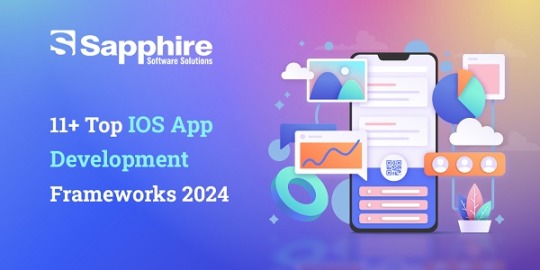
#iOSDevelopment#AppFrameworks#TechInnovation#MobileAppDevelopment#iOSDevTools#SwiftLang#Xcode#CodingCommunity#DeveloperResources#AppDev2024#TechTrends#TopFrameworks#MobileApps#InnovationHub#CodeLife
0 notes
Text
Apple Wprowadza Nowe Wersje TestFlight i Xcode z Wsparciem dla Vision Pro
Apple dzisiaj udostępniło Xcode 15.2 oraz TestFlight w wersji 3.5, które zostały zaktualizowane o wsparcie dla zestawu Apple Vision Pro, który ma zostać wprowadzony na rynek na początku lutego. Xcode 15.2 jest wyposażony w SDK visionOS, a według notatek do wydania, Apple wprowadziło kilka poprawek do oprogramowania dotyczących visionOS. Xcode 15.2 może być używany przez programistów do tworzenia…

View On WordPress
0 notes
Text
Erase M1 Mac and Reinstall for Java Development
Erase your Mac
Choose Apple menu > System Settings, then click General in the sidebar. (You may need to scroll down.)
Click Transfer or Reset on the right, then click Erase All Contents and Settings.
In Erase Assistant, enter your administrator information and click Unlock.
Review items that will be removed in addition to your content and settings.If your Mac has multiple user accounts,…

View On WordPress
0 notes
Text
How Difficult Is IOS App Development
#iOSAppDevelopment#iOSDevelopment#AppDevelopment#MobileAppDevelopment#iPhoneAppDevelopment#Swift#ObjectiveC#Xcode#AppProgramming#Coding#Developers#iOSApp#iOSProgramming#SoftwareDevelopment#TechSkills#ProgrammingLanguages#iOSApps#AppleDeveloper#iOSDevelopers#AppDesign
0 notes
Text
Sending the Push Notification using APNS
First Open the project
Step 1: Ask permission to allow the notifications
Add the import in App Delegate
import UserNotifications
In AppDelegate --> create a method functions() --> Add the logic
func notifications() {
let notificationCenter = UNUserNotificationCenter.current()
notificationCenter.requestAuthorization(options: [.sound, .badge, .alert]) { s, err in logic }
}
Call this method in App Delegate didFinishLaunchingWithOptions()
Step 2: Open Terminal and go to the path where this apns file is saved
Type the following command which includes
How to get deviceId: Xcode --> Windows --> Devices and simulators --> Simulators --> choose the running simulator --> copy the deviceid
xcrun simctl push deviceId bundleId apnsfilename
xcrun simctl push DRCT74-GTYB-49BC-B023-C15632C131E com.encrytion.login apn.apns
0 notes
Text
0 notes
Text
Xcode sticks to its traditions: Persisting "editor placeholder in source file" errors since 2015. 🙄
0 notes